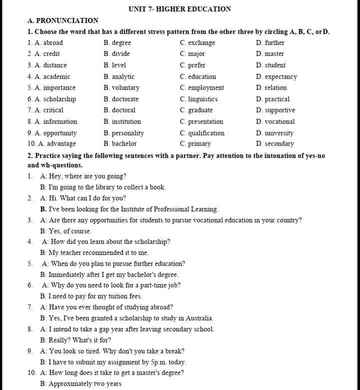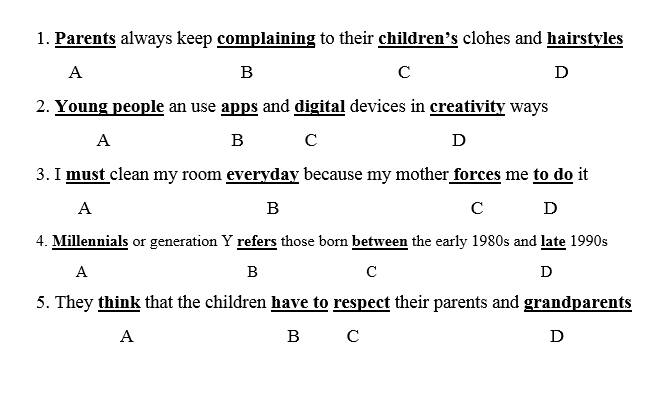2. Don't be deceived by his long word
---> Don't let....
2. Don't be deceived by his long word
---> Don't let....
Mọi người giúp mình vs ạ!!! Cần gấp!!! Có giải thích lun ạ!! Mk xin cảm mơn nhìu nha!!
A. PRONUNCIATION 1. Choose the word that has a different stress pattern from the other three by circling A, B, C, or D. 1. A. abroad B. degree C. exchange D. further 2. A. credit B. divide C. major D. master 3. A. distance B. level C. prefer D. student 4. A. academic B. analytic C. education D. expectancy 5. A. importance B. voluntary C. employment D. relation 6. A. scholarship B. doctorate C. linguistics D. practical 7. A. critical B. doctoral C. graduate D. supportive 8. A. information B. institution C. presentation D. vocational 9. A. opportunity B. personality C. qualification D. university 10. A. advantage B. bachelor C. primary D. secondary 2. Practice saying the following sentences with a partner. Pay attention to the intonation of yes-no and wh-questions. 1. A: Hey, where are you going? B. I'm going to the library to collect a book 2. A: Hi. What can I do for you? B. I've been looking for the Institute of Professional Learning 3. A: Are there any opportunities for students to pursue vocational education in your country? B: Yes, of course. 4. A: How did you learn about the scholarship? B: My teacher recommended it to me. 5. A: When do you plan to pursue further education? B. Immediately after I get my bachelor's degree 6. A: Why do you need to look for a part-time job? B. I need to pay for my tuition fees. 7. A: Have you ever thought of studying abroad? B: Yes, I've been granted a scholarship to study in Australia. 8. A: I intend to take a gap year after leaving secondary school. B: Really? What's it for? 9. A: You look so tired. Why don't you take a break? B. I have to submit my assignment by 5p m. today. 10. A: How long does it take to get a master's degree? B: Approximately two years
Read the passage below and choose one correct answer for each question.
In Britain, wedding invitations go out about six weeks before the wedding day. The guests reply as soon as possible to say if they can come or not. Choosing a present for the couple can be difficult. People don’t take their present for the wedding. They send them to the woman’s house before the wedding day. Most weddings take place before lunch or in the early afternoon. Many people like to get married in church. The bride often wears a long white dress. Guests wear their best clothes and most of the women wear hats. In the church, the bride’s family sits on the left and the groom’s one sits on the right. Married people wear their wedding rings on the third finger of the left hand. Most married women wear wedding rings, but married men often do not.
The word presents synonyms with _____.
A. flowers
B. gifts
C. hats
D. fingers
He was exhausted by his work. He threw himself on his bed ( participle phrase) -> Exhausted by his work. he threw himself on his bed Đúng ko ạ ??

giúp mk sửa lại lỗi sai vs ạ mk cần gấp
Read the passage below and choose one correct answer for each question.
In Britain, wedding invitations go out about six weeks before the wedding day. The guests reply as soon as possible to say if they can come or not. Choosing a present for the couple can be difficult. People don’t take their present for the wedding. They send them to the woman’s house before the wedding day. Most weddings take place before lunch or in the early afternoon. Many people like to get married in church. The bride often wears a long white dress. Guests wear their best clothes and most of the women wear hats. In the church, the bride’s family sits on the left and the groom’s one sits on the right. Married people wear their wedding rings on the third finger of the left hand. Most married women wear wedding rings, but married men often do not.
According the passage, which of the following is NOT true?
A. Invitations are sent out some weeks before the wedding day.
B. People who accept the invitations have to send their presents to the couple.
C. It is not easy to choose a present for the couple.
D. Married people wear their wedding rings on the third finger of the right hand.
Read the passage below and choose one correct answer for each question.
In Britain, wedding invitations go out about six weeks before the wedding day. The guests reply as soon as possible to say if they can come or not. Choosing a present for the couple can be difficult. People don’t take their present for the wedding. They send them to the woman’s house before the wedding day. Most weddings take place before lunch or in the early afternoon. Many people like to get married in church. The bride often wears a long white dress. Guests wear their best clothes and most of the women wear hats. In the church, the bride’s family sits on the left and the groom’s one sits on the right. Married people wear their wedding rings on the third finger of the left hand. Most married women wear wedding rings, but married men often do not.
When do the British have to send wedding invitations?
A. after the wedding day
B. in the wedding day
C. before the wedding day
D. no need to send
Read the passage below and choose one correct answer for each question.
In Britain, wedding invitations go out about six weeks before the wedding day. The guests reply as soon as possible to say if they can come or not. Choosing a present for the couple can be difficult. People don’t take their present for the wedding. They send them to the woman’s house before the wedding day. Most weddings take place before lunch or in the early afternoon. Many people like to get married in church. The bride often wears a long white dress. Guests wear their best clothes and most of the women wear hats. In the church, the bride’s family sits on the left and the groom’s one sits on the right. Married people wear their wedding rings on the third finger of the left hand. Most married women wear wedding rings, but married men often do not.
Many people like to hold their wedding ceremony _____.
A. in a park
B. in church
C. at home
D. at a restaurant

Sửa lỗi sai và sửa lại giúp mk vs! Cảm ơn ạ
Gerund and To-infinitive
1. If a thing is not worth(do) at all, it is worth(do) well.
2. I'm beginning (understand) what you mean.
3. The boys like (play) games but hate (do) exercises.
4, I can't understand her (behave)like that.
5. It wouldn't be safe (start) down now, we'll have (wait)till the mist clears.
6. I tried ( explain) to him but he refused (listen) and went on (grumble)
7. She likes her children (go) to the dentist every 6 months.
8. I know my hair wants (cut) but I never have time (go) to the hairdresser's.
9.-Why didn't you drink it?
-] didn't like (drink) it as I didn't know what it was .
10. Did you advise him (go)to the police?
-No, I didn't like (give) any advice on such a difficult matter.
11. 1 (like) (bathe)there but there wasn't time.
12. Do stop (talk); I'm trying (finish) a letter.
13. It is usually easier (learn) a subject by (read) books than by (listen) to lectures.
14. Some people seem ( have) a passion for (write) to the newspapers.
15. I resented (bve) unjustly accused and asked him (apologise).
16. He made me (repeat) his instructions (make) sure that I understood what I was
(do) after he had gone.
17.1 keep (try) (make) mayonnaise but I never succeed.
-Try (add)the yolk of a hard-boiled egg.
18. I distinctly remember (pay) him. I gave him $2.
19. It's no good (write) to him. He never answers.
20. I knew I was not the first (arrive), for I saw smoke ( rise) from the chimney.
21. I remember (read) a review of that book and think I (like) (get) it.
22. I hate (borrow) money.
23. I (like) (photograph)it but I had no more film.
24. I (like) (ask) a questionbut I was sitting so far back that I'd be heard.
25. I can remember (be) in hospital when I was 4.
25. This book tells you how (win)at games without actually (cheat).
26. The boys next door used (like) (make) and (fly) model aeroplanes, but they
seem (stop) (do) that now.
27. Don't forget (post) the letter I gave you.
28. There was a lot of traffic but we managed (get) to the airport in time.
29. When I'm tired ,I enjoy (watch) TV. It's relaxing.
30. It was a nice day, so we decided (go) for a walk.
31. It's a nice day;Does anyone fancy (go) for a walk?
32. I'm not in a hurry. I don't mind (wait).
33. They don't have much money. They can't afford (go) out very often.
34. I wish that dog would stop (bark). It's driving me mad.
35. Our neighbour threatened (call) the police if we didn't stop the noise.
36. We were hungry, so I suggested (have) dinner early.